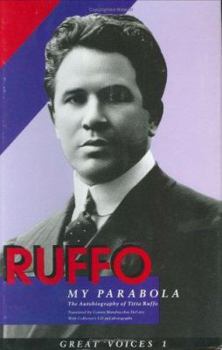Ruffo, My Parabola: The Autobiography of Titta Ruffo = La MIA Parabola
No Synopsis Available.
Format:Hardcover
Language:English
ISBN:1880909391
ISBN13:9781880909393
Release Date:January 1995
Publisher:Baskerville Publishers
Length:490 Pages
Weight:2.25 lbs.
Dimensions:2.0" x 6.5" x 9.5"
Customer Reviews
2 ratings
The autobiography of an egotist (with some bonuses)
Published by Thriftbooks.com User , 20 years ago
Titta Ruffo (1877-1953) was one of the greatest baritones of the twentieth-century. In his prime (1905-1925) he had an enormous, powerful voice considered by many who heard him the most impressive baritone voice ever. W. J. Henderson, the distinguished NYC music critic, wrote of him: "Titta Ruffo unites in his voice the beauty of Caruso, the classicism of Jean de Reszke, and the power of Tamagno." The classicism of Jean de Reszke? Well, perhaps a more just and accurate overall assessment is from The Metropolitan Opera Encyclopedia: "Endowed with the most imposing baritone voice of his generation, Ruffo cultivated an aggressive, dramatic style far removed from the suavity of Battistini and Ancona. Under such heavy usage, even his magnificent instrument--dark bronze in color, wide in range, with superb breath control--wore down prematurely (recognizing his own fault in this, he declined to teach)." Not content with the natural hugeness of his voice, he developed the habit (clearly audible in many of his recordings) of forcing certain tones to make them sound even more powerful, with the result that his voice aged prematurely. His training had been hit-or-miss (short stints with several teachers) and he was basically self-taught. After he had retired, when asked by a journalist why he didn't teach singing, he replied: "I never knew how to sing; that's why my voice didn't last beyond my fifties. I have no right to profit from my fame and try to teach something which I did not know how to do." Such candor from a world-famous singer is more than refreshing; it's amazing! Fortunately he made many recordings, and to cite only one, his 1914 recording of the great tenor/baritone duet "Si pel ciel" from Otello with his contemporary Caruso is one of the most famous ever made. His autobiography enjoys the reputation of being one of the better books by a singer about his/her career, so I read it with anticipation. I wish I could recommend it with more enthusiasm. It has its moments; I liked best the early pages describing his boyhood, youth, and attempts to learn how to sing. But overall I found the book disappointing; I'd hoped for more. No doubt it's unrealistic to expect objectivity and even-handedness in the autobiography of a famous singer, but here I find not even a semblance of these qualities. Ruffo emerges as self-absorbed and full of himself; there is nothing of the refreshing, self-deprecating candor I'd hoped for from the late-in-life remark quoted above; quite the contrary. Everything he writes here is ultimately self-serving and glowingly self-aggrandizing. Nothing is mentioned here of a seriously self-critical, self-examining, or self-questioning nature. Indeed, no chink in the armor is permitted to be glimpsed in this tirelessly self-promoting narrative. Instead, there is an endless recitation of triumphs which eventually becomes monotonous. Everything is me, me, me; my stunning success here, my triumph there, my ova
The extraordinary story of a great singer
Published by Thriftbooks.com User , 22 years ago
Titta Ruffo died in 1953, in reduced circumstances, but not forgotten. His career, as the title suggests, was meteoric in both its rise and fall. In real life he was a proud, controversial figure, and paid dearly for his opposition to the Fascists. But about his voice, there isn't ever any disagreement: it was a miracle.Ruffo's memoirs have been translated into English. His son and a researcher have appended his story with footnotes, but mostly this is Ruffo's story. The man matches the voice: proud, grand, imposing. He covers mostly his career, and is often frustratingly coy about his private life. For example, his lover is only called "Benedetta" (the footnotes give us info about her real name). He's not really humble, and has no special graciousness towards his rivals: Nellie Melba, his former teachers (he resented them for lavishing attention on Giuseppe de Luca), Giulio Gatti-Casazza, and others do not come across well. But overall it's impossible not to admire the man, and relish a good story about an adventurous life well-lived. Particularly interesting are his stories of serving in the Italian army during WWI. The memoirs stop around 1930. No doubt Ruffo did not want to recall the difficult years after that, when his career floundered, he was in trouble with the Fascists, and the once-great baritone had to fight poverty. It is somewhat disappointing, but understandable.As a 'bonus' Baskerville has provided a cd of Ruffo's singing. Overall, this is a fitting tribute to a great man and a great singer. A shame it's OOP.






